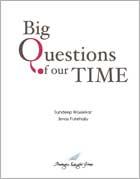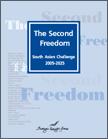House of Wisdom of the Twenty First Century
 |
May 2006
By Ilmas Futehally
|
When I boarded the Qatar Airways flight on my return from Doha to Mumbai, I remembered a story. The ancient manuscripts of Greek, Indian and Arabic wisdom were on the verge of disappearance. One day, about a thousand years ago, King Al-Mamun, the son of Harun Al Rashid, decided to invest in translating and preserving the ancient wisdom. It did not matter how much it would cost. The royal court gathered all the intellectuals it could and commissioned them to bring best of the knowledge from far away and develop it. The Arab world thus began the process of founding the modern thought. It gifted the first lessons in algebra, healthcare, astronomy and medicine to the humanity. Such a Renaissance was possible because of the Houses of Wisdom that the Abbasid rulers had establish with a great zeal. In some ways, the humankind is today what it is because of the House of Wisdom of the Abbasids.
Sheikha Mozah addressing the Arab Expatriate Scientists Conference in Doha, April 2006
Her Highness Sheikha Mozah, with support from the Emir of Qatar, seems to be determined to turn Qatar into a House of Wisdom of the twenty first century. The strategy is to create a set of academic institutions of international repute in the huge education complex to train the next generation of the Qataris. As the first step, a few American universities, specialised in medicine, engineering, arts and diplomacy have set up their regional centres.

Sheikha Mozah addressing the Arab Expatriate Scientists Conference in Doha, April 2006The Qatar Foundation is encouraging students and experts from other countries in the Arab world to take advantage of its educational facilities and liberal scholarships. In fact, when I visited Doha, the foundation had convened a conference of Arab expatriate scientists to woo them back to the region to use their expertise for the region�€™s development. Several of them were Iraqis who do not effectively have a country to return. It won�€™t be surprised if Doha repays Baghdad�€™s debt to the Arab world a thousand years after the Abbasids gave birth to the Arab intellectual revolution.
While beginning with college level education, Her Highness Sheikha Mozah has plans to position Qatar as a centre of scientific research. A science and technology park is in the making, with a view to attract R&D facilities of multinational corporations. There are also plans to set up a research hospital. Qatar foresees a great role for itself in biotechnological, IT and energy related research.
The changes are not only to be seen in the growing physical assets in the education sector but also in social and psychological transformation. The university has instituted Doha Debates in collaboration with BBC to train young people to disagree in an informed and civilised way. When I was in Doha, there happened to be a debate on the future of the Arab League. Some of the leading experts from Lebanon, Kuwait and Egypt had especially flown in for the evening to argue their respective viewpoints.
To be successful, Qatar will need to build local capacity at the earliest. Importing know-how from the West is inevitable in the beginning but a serious effort needs to be made to secure knowledge from the East and then to develop an indigenous knowledge base. It is a long-term game. It takes about 20 years to take fundamental research to the stage of a market relevant commercial production. Will Qatar have the patience to look beyond its current horizons? Will Qatar facilitate the birth of at least a couple of technological innovations in this century by Arab scientists that will create a psychological breakthrough for the entire Arab social mindset? Will Qatar lead the creation of a context that encourages free scientific and critical enquiry? Will Qatar take a lead in the emergence of an Arab and Islamic Renaissance in the twenty first century?
Related Publications
-
.jpg&maxw=50)
Big Questions of Our time: The World Speaks, 2016
Download:Big Questions of Our time: The World Speaks _Full Report
-

-

Second Freedom South Asian Challenge 2005-2025, 2005
read more
Download:Second Freedom South Asian Challenge 2005-2025 Full Report
Related latest News
Related Conferences Reports
-

Global Challenges Conference, October 2016
Download:Global Challenges Conference Report
-

Conference on Responsibility to the Future: Business, Peace and Sustainability, June, 2008
Download:Global Security and Economy: Emerging Issues


